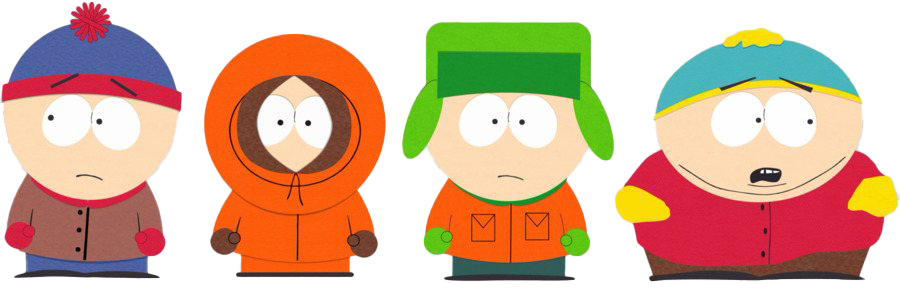

local idiot reads too far into a satirical cartoon: the movie
---
i really do have a lot to write here, i swear... i just haven't had the
energy to rewatch south park lately, and the nuances of my discussions
will require rewatches of certain episodes so that i can quote things
correctly/remind myself of certain details. i want to write these
'essays' primarily just to explain my own stupid misguided
interpretations of the characters and also because im not insane if you
just listen to me, i know what i'm talking about, let me explain myself
anyway, i guess i can ramble on about a lot of this without details for
now because i think about it a Lot and i'll be able to get my point
across fairly well.
Case Study 1: Stan Marsh's Addictive Personality: Why "You're
Getting Old" Isn't a Joke
Alright, let's get started with Stan, because I have less personal
bias here, and more explicit evidence. The two parter set of episodes
"You're Getting Old" and "Assburgers" are a shocking and disturbing
deviation from South Park's usual tone. They are, like many other
episodes, a commentary on many things at once - but for the purposes of
this essay, they are a metaphor for the show itself losing focus, and
Stan's (overlooked in the episode, but still painfully apparent)
depression.
The beginning of the second episode, Assburgers, is eerily quiet. There
is no soundtrack or backing music, very little dialogue, and no jokes
for a painfully long time, until the episode really gets rolling. And
the end of the episode shocks the audience with the 'throwaway'
revelation that Stan has to drink himself into an altered state before
he can even have fun anymore. There is no punch line here. This is an
example of South Park's seldom used 'stinger' trope of silence and
elongated near-credit sequences that they use when they drive home a
serious point; compare to the suicide scene at the end of "Cash for
Gold" or Wendy's Photoshopped pictures at the end of "The Hobbit."
So, what gives, here? This isn't funny. The way it's presented, as
mentioned above, means that we're supposed to take it seriously. So,
suddenly Stan is an alcoholic? That came out of nowhere.
Except, no, not really. There has never been any indication before this
episode that Stan had any inclination for drinking or drugs, but the
groundwork in terms of his personality has been laid for years before
this episode came out, and it makes a lot of sense in hindsight that he
would come to rely on this unfortunate coping mechanism.
Stan is a boy who doesn't know what he wants, or who he wants to be. He
is complacent and happy to follow trends, throwing himself
wholeheartedly into different causes and groups, even without research
or thinking through the consequences. I can rattle off a number of
examples - half-hearted veganism ("Fun With Veal"), jumping on a boat to
save the whales ("Whale Whores"), faking political interest for
attention (quoting the movie: "For Wendy I'll be an activist too /
'Cause that's what Brian Boitano'd do!"), not to mention his stint as a
goth kid or his horrible, superior attitude in Butterballs. These are
all Stan's issues. These aren't comparable to episodes where
all the boys hop on a fad, like Chinpokomon or metrosexuality.
Stan falls victim to peer pressure far more than the other boys do, and
Kyle calls him out on it multiple times.
Next: the history of addiction in Stan's family. Randy gets blackout
drunk more times than I can count, oftentimes in front of his own son. I
can't help but recall the quote, "It's not getting drunk, it's called a
wine tasting, and it's classy." (I believe this is from "Gluten Free
Ebola," but I could be wrong.) He's a horrible influence for Stan. In a
much later - but still relevant - episode, "Freemium Isn't Free," we see
Stan struggling with another addiction: mobile app purchases. In this
episode, we explicitly learn of his grandfather's gambling addiction, so
it's clear that his family already has a track record here. It's not
hard to believe that Stan's seen this behavior first-hand in addition to
his genetic predisposition to it.
Case Study 2: Eric Cartman's Internalized Homophobia
oh boy. y'all won't be ready when i get to this one
Case Study 3: Eric Cartman's Identity Crisis
same as above. im about to make a fool of myself